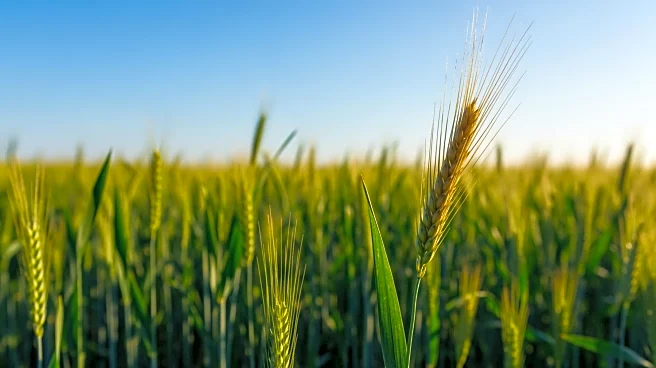What's Happening?
Wheat farming is confronting significant challenges due to evolving climate conditions and the prevalence of rust diseases, which threaten over 40% of the global wheat harvest. Rust fungi, including stem rust, leaf rust, and stripe rust, are rapidly evolving,
overcoming the resistance of existing wheat cultivars. These diseases, coupled with climate-induced abiotic stresses such as drought and heat waves, are complicating wheat agriculture. Innovations in disease management, climate resilience, and sustainable farming practices are being adopted to address these challenges. Technologies like satellite-based monitoring and AI-driven advisory systems are providing real-time insights to support sustainable soil, irrigation, and fertigation management, aiming to boost wheat crop production and security.
Why It's Important?
Wheat is a crucial staple crop, feeding billions globally and supporting livestock feed industries and various industrial uses. The resilience of wheat farming is vital for global food security and economic stability. The ongoing threats from rust diseases and climate pressures necessitate robust management strategies to prevent catastrophic losses. Innovations in genetic breeding, digital monitoring, and sustainable practices are essential to enhance wheat resilience against climate-induced losses. These efforts are critical to maintaining stable wheat production, which is indispensable for the dietary needs of approximately 2.5 billion people worldwide.
What's Next?
The future of wheat farming will rely heavily on integrated and technology-driven approaches. Real-time digital monitoring, AI-assisted disease warnings, and automated data-driven advisories will dominate wheat agriculture. Investments in research and breeding for multi-race rust and drought resistance will intensify, incorporating rapid screening using gene editing tools and AI-powered selection. End-to-end blockchain product traceability will become crucial for sustainable and market-ready wheat products. As climate patterns remain volatile, investing in wheat farming resilience is essential for global food security.
Beyond the Headlines
The adoption of sustainable practices in wheat farming could boost resilience by up to 30% against climate-induced losses by 2026. These practices include soil health management, climate-smart irrigation, and diversification of wheat varieties. The integration of digital technologies like AI and remote sensing is transforming wheat agriculture, enabling timely interventions and efficient resource allocation. The role of platforms like Farmonaut in providing real-time insights and decision support is pivotal in addressing both immediate and strategic challenges in wheat farming.
















